Explain what you do and why your audience should care.
You have 12 seconds.
Here’s one we did earlier:
We find the right words for expert-led businesses. We clarify their brand message and create strategic content to make them stand out as authorities in their field.
That’s the RH&Co value proposition in a nutshell. It took quite a bit of work and a fair few conversations before we were able to communicate this so clearly. And what we do is – in the grand scheme of things – relatively simple to explain. We’re copywriters, content strategists, marketers.
Many of our clients, however, are experts in complex subjects that don’t lend themselves to a one or two word description. We’ve worked with a number of them to create foundational copy, messaging and brand voice guidelines to help them clearly communicate what they do.
Here’s a few questions that we’ve found helpful to ask along the journey:
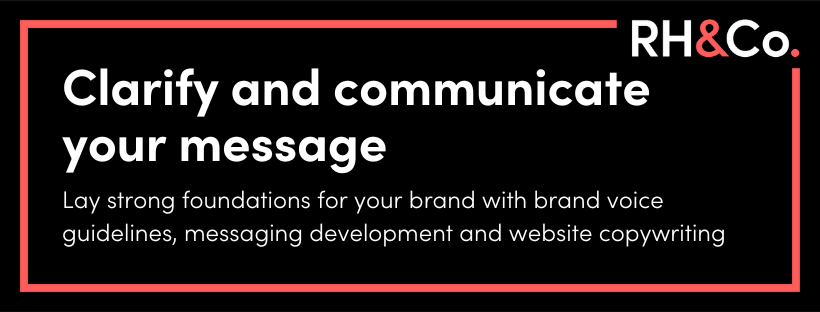
Does every stakeholder in your audience speak your language?
The first and most important step in any communication is to know – really know – who you’re talking to. If you’re a B2B tech brand with a no code/low code product and your target persona is a CTO or CIO who already knows the API calls they need, then talking at an expert level and using appropriate jargon is perfectly acceptable.
If, on the other hand, you first need to win over a stakeholder with less technical knowledge, you’ll need to think about what they might need to understand, what might confuse them, where they might draw the wrong conclusions or be put off by technical language.
The beauty industry is a great example of where brands do value proposition well. Sure, they might mention retinol or keratin or silica to give a gloss of scientific weight to their advertising. But they know that their audience aren’t scientists – they just want younger looking skin, glossier hair, and sparkling white teeth.
The same often applies to tech products and users. When we worked with The Land App to create messaging for their brand, we needed to find language that would position their product as an expert-level mapping tool.
We also needed the messaging to resonate with a diverse audience made up of everyone from farmers and estate managers to ecologists and surveyors.
To avoid patronising the technical experts, we needed to talk about ‘data layers’ and ‘delivering biodiversity net gain’ but we also needed to summarise the essence of this multifaceted product in language every potential user could understand.
We settled on messages such as:
- “Design a sustainable planet, together”
- “Intuitive mapping, collaboration and insight”
- And, to make it super clear who benefits, “Join our network of farmers, farm advisors, land agents, estate managers, ecologists, foresters, surveyors and landscape recovery projects”
So even if you’re not an ecologist looking to deliver biodiversity net gain, you can quickly see how The Land App’s product might help you achieve your vision.
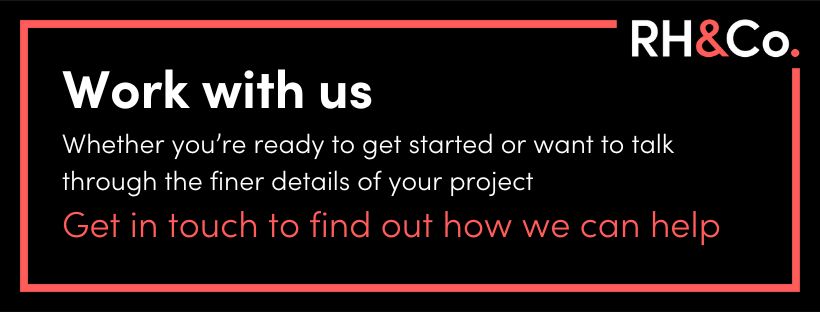
Are your features clear in your value proposition? And are your benefits believable?
When it comes to encapsulating benefits vs features in your value proposition, the best description of the concept is the truth universally acknowledged by marketers: no one wants a quarter inch drill bit; they want a quarter inch hole.
The trouble is, these days, lots of brands are claiming to offer the same hole a million different ways.
- Attract and retain your customers
- Engage your employees
- Transform your culture
And, of course, the classic:
- Save time and money.
In the end it all sounds a bit like vapourware. Marketers mustn’t forget features in their rush to sell the benefits. Your SaaS product, ESG consultancy offering or L&D programme might be difficult to summarise, but don’t settle for broad, vague promises in an attempt to make it simple.
Rather than toning down the richness of the expertise involved to make your brand understood, it’s more about finding the right blend of features, benefits and language.
Futureground are a team of subject matter experts in the truest sense. Their partners have even described them as polymaths (think Leonardo Da Vinci) of the built environment. However, describing what they do is a much tougher challenge. Not least because it looks different for every single client they work with.
Some of their competitors have floundered here, describing themselves as ‘delivering sustainable solutions’, which is about as vague as you can get.
We went for something more concrete for Futureground:
Who is walking with you through complexity?
We’re sustainable place strategists with decades of experience working across the property lifecycle, and we can step alongside you as a critical friend in this complex world.
Sometimes this means forming an action plan. Often it means working closely with stakeholders. It always means asking good questions.
Then we grounded all of that in social proof through case studies. You can find out more about the rebranding journey on the Futureground website.
Does your audience know they need you?
What made the Futureground case even more challenging was that their audience is often not problem-aware.
If your audience is problem-aware, they know they have an issue. But when they are pretty low problem-aware, they need some help defining the real issue. So perhaps they think they need more leads but what they actually need is better quality leads or better CRM tracking.
This is where you really need to drill down and understand your audience – so you can figure out how to position your solution in a way that makes them want to solve a problem they don’t know they have.
This is toughest when you’re looking to disrupt the market in some way. A product or service that sits in a category of its own, or across more than one category, so that people either have no idea what it is or confuse it with things it isn’t.
Let’s take Nespresso as an example. When they first brought out their pod-based coffee model, people may well have laughed. Why would you want to spend 40p on a cup of coffee you had to make yourself, when you can have any other instant for a fraction of the price?
But Nespresso knew that their audience wasn’t looking for a better tasting instant coffee. They were looking for a cost effective alternative to high quality take away coffee, which they could make in the comfort of their own home. And so that’s how they communicated their offering.
Slack played a similar trick in their initial marketing campaigns. They didn’t try to sell themselves as a messaging service or a digital workplace. Instead they simply said: ‘Slack replaces email in your company’. The people came, because while few companies knew they had a comms problem, once pitched against email, Slack made sense instantly.
Use this value proposition pitch format to help explain what you do
Whether you’re selling a complex technology product or you’re delivering your service via a disruptive new business model, it’s important that you can communicate your business offering in a way that is clear and easy for your audience to understand.
Use this pitch format to start honing your key messaging: For [your ideal customers or clients] who are [trying to do X or facing X challenge], [your product or service] is a [product category] that provides [key value proposition]. Unlike [closest alternatives] [your product or service] offers [key features].
If you’re struggling to put it succinctly, you have more work to do.
If you run it by a potential user and they don’t instantly grasp the value, you have more work to do.
You don’t have time to explain everything.
You can’t afford to be misunderstood.
You need a complex value proposition in a nutshell.
To find out more about how we can help you define and communicate your business offering, get in touch to learn about our brand voice, messaging and other consultancy services.
Every business needs written content. Website copy, blog posts, white papers, case studies – the list goes on. In a startup or micro business, this copy is often written by a founder or another member of the team. But eventually the need for either quality or quantity – or both – means it’s time to hire in a freelance copywriter or copywriting agency.
The question is, which one is right for your business?
In this article, we’re going to look at the advantages and disadvantages of freelance copywriters and copywriting agencies. This won’t help you select an individual writer or agency – you can read more about that in this post on how to hire a copywriter. Instead, we’ll go through some of the factors you should be considering in order to decide what will suit you best.
TL:DR
- Why use a freelance copywriter?
- Why use a copywriting agency?
- Is RH&Co right for your business?
- Conclusion
Why use a freelance copywriter?
A good freelance copywriter is worth their weight in gold. As well as our in-house writers and editors, we have a small but brilliant team of freelancers who are an integral part of the agency.
So we’re not here to suggest that copywriting agencies are in any way better than freelancers. In fact, there are many situations in which we would advise that you go down the freelance route.
Here are some factors that make freelancers appealing.
Cost
In most cases, a freelancer is likely to be less expensive than an agency simply because they don’t have the same overheads. They’re also unlikely to be earning over the VAT threshold, saving you a chunk of money if you yourself aren’t VAT registered.
Freelance rates vary widely depending on experience and even location (London prices tend to be higher than Bristol prices, for example). A junior might start out charging as little as £150 a day, whereas someone more specialist or experienced might charge four or more times that.
There is likely to be some crossover between the highest freelance rates and the rates charged by the smaller agencies though, so don’t be afraid to get a range of quotes. Just make sure you’re comparing like-for-like in terms of what’s being delivered.
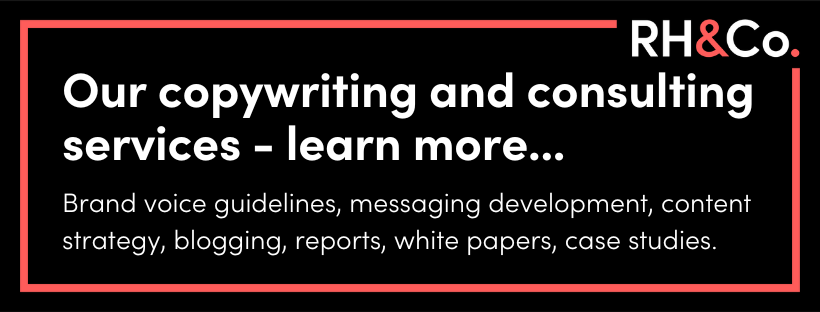
Flexibility
Where agencies will have their processes in place, a freelancer may well have more flexibility. For example, they might be happy to come and work in-house at your offices for a period of time. They are also unlikely to have minimum fee or retainer terms.
Retainer relationships do make sense on a number of levels. First, there is a degree of work to be done upfront in getting to know a client and understanding their industry, establishing tone of voice, messaging and more. Also, in the case of content marketing, it takes time to see results.
But you might not want a long-term relationship. Perhaps you only need someone to do a small, one-off piece of work, or perhaps your budget is too uncertain to commit to a monthly outgoing. Or you might just be testing the water. In which case, a freelancer may be a good bet.
Control
When you work with a freelance copywriter, they essentially become an extension of your team. You’ll manage them directly rather than going through an account manager, which may give you a greater sense of having eyes on all stages of the content creation process.
This is great for founders who are naturally close to their business and feel protective of anything that gets written on their behalf, or marketing managers who are used to managing a team, setting strategy, giving feedback and generally running projects.
If your business is growing and your copy requirements are likely to grow with it, then you need to be sure that your provision will be able to expand to meet that.
Why use a copywriting agency?
This is not where we do a big old sales pitch. As we’ve demonstrated above, there are many reasons why you might need a freelance copywriter. And if you find a good one, hold onto them!
But there will be times when getting an agency on board is going to suit your needs better.
A variety of experts
With a freelancer, you’re relying on one person to have a number of different skillsets. With an agency, you’ll get a team that brings together a variety of specialists.
For example, you might have a brand consultant to help you with your brand voice and messaging, a content strategist to help you create your editorial calendar, an account manager to interview your experts, a writer to create the draft content and an editor or proofreading to ensure it’s polished before it reaches you.
Consistent capacity
One key issue with freelancers is capacity. An agency will have greater internal resources, as well as access to a pool of tried and tested freelancers. What’s more, they’ll have processes in place for resource planning and managing consistency of quality. As a result, you shouldn’t have to wait weeks before they can fit you in and you’ll never have to worry about what happens if your writer gets sick or wants to take a holiday.
Likewise, if your business is growing and your copy requirements are likely to grow with it, then you need to be sure that your provision will be able to expand to meet that. One person can only do so much work, whereas a team has potentially infinite capacity.
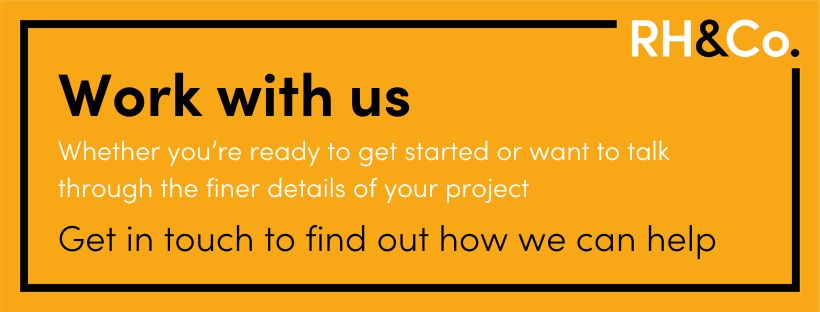
Project management
As well as accessing a variety of strategic and creative experts, using a copywriting agency means you’ll have to do less on the project management side of things too.
An agency will provide a fully managed service, handling everything from brief creation through copy drafting, editing and proofing, managing the writers and even liaising with other professionals like designers or developers. That’s a lot less mental load for you to deal with.
Quality
We’re not suggesting that agencies produce better work than freelancers. But the reality is that there are plenty of bad copywriters out there. Choosing an agency should give you at least a minimum standard of quality.
A not-so-great freelancer might be able to get by on good luck but a substandard copywriting agency won’t last long. It’s just too competitive out there and running a business – with employees to pay, office space to rent, insurance, accountancy fees and a million other expenses besides – means there’s no room for slackers.
Is RH&Co right for your business?
Everything we’ve written so far has been designed to give you a broad brush and unbiased view of the copywriting market. Of course, not every freelance copywriter or copywriting agency is the same. So what about us?
Cost
Because no two projects are alike, we create proposals on a bespoke basis, taking into account factors like the type of work involved, the complexity of the subject matter, how quickly it needs to be turned around and the value it will deliver.
Our minimum project fee is £2,500+VAT, while retainers start at £1,250+VAT, with most of our regular clients tending to have annual budgets of between £15,000 and £50,000 for content.
We put our prices up every January as standard, to reflect the increased cost of living, our commitment to pay our team and freelancers fairly, and the increasing value we aim to deliver year on year. For the last two years this increase has been around 10%.
Specialism
Our specialism as an agency is in working with expert-led businesses to help them clarify and communicate their message and establish their expertise through content.
Our services include:
- A range of consultancy services around brand voice and messaging development, content strategy creation, and campaign design
- Creation of foundational copy for websites, pitch decks, corporate brochures etc
- Ongoing content creation including blogging, white papers, case studies etc.
Our writing team pulls together experience across a wide range of industries, primarily in tech, healthcare, sustainability and B2B services, and we are particularly experienced in working with complex subject matter to draw out the elements that readers will find engaging.
Flexibility
As a relatively small copywriting agency, we like to think of ourselves as being pretty agile in the way we work with our clients. However, we aren’t able to provide writers to work in-house on your premises.
We do work on both a project and a retainer basis, with retainer SLAs being set for a minimum of six months to ensure that we can provide the most value. In reality, most of our clients stay with us for much longer!
Team and capacity
With both in-house copywriting resources and a team of handpicked freelancers on our books, we almost always have capacity to work with new clients. We also have processes in place to cover sickness and holiday absence.
We can usually book in a kickoff session within a fortnight of you making the decision to work with us, during which we’ll agree on timeframes for your project. As a general rule, first time content projects tend to take a minimum of six weeks, although in some circustances we can work to tighter deadlines.
Every project, whether one-off or ongoing, has – at the very least – a dedicated project manager, a writer and a separate editor to ensure that the quality of the copy we produce meets RH&Co standards. You can find out more about the in-house team on our About page here.
Conclusion
Hopefully by now you’re feeling a lot more confident about whether or not you should be aiming to work with a freelance copywriter or a copywriting agency – and whether we might be a good fit. Let’s sum up the main points.
You should choose a freelance copywriter if:
- You have a small, one-off project such as a single flyer
- You have a limited budget for a bigger job such as a website
- You want the writer to work in-house in your offices
- You’re not ready to commit to a longer term relationship
You should choose a copywriting agency if:
- You want to ensure sufficient ongoing capacity
- You need the support of an experienced team
- You want be sure of a minimum standard of quality
- You’re committed to using copy strategically on an ongoing basis
Whether or not you should work with us is something you won’t fully be able to decide until you’ve had a chat with us. After all, you want to know that whoever you choose, you’re actually going to get on with them, right?
If you want to get to know us a bit better, drop us a line to arrange a call. In the meantime, feel free to have a look around the site, and why not connect with us on LinkedIn?
Have you ever had a project that involved some sort of writing, but had to ask yourself, “What kind of writer do I need?” Or have you thought you were asking the right person, only to find that’s not actually what they do?
Every now and then, someone will ask me if I can write them a press release or whether I’d be able to write the content for their social media feed. While technically the answer is yes, in reality I’m generally not the person they’re looking for. Key differences separate a copywriter from other types of writers.
If you have a writing project and you’re not sure who it is you need to hire in to do it, this guide will give you a nudge in the right direction.
TL:DR
- I need someone to write a press release
- I need someone to write posts for social media
- I need someone to check my writing
- I need someone to write my marketing plan
- I need someone to write my newsletter
I need someone to write a press release
A press release is literally that: information released to the press i.e. the media. It might be an announcement about a new product launch or an award nomination or a merger or an exciting new hire. Whatever the case, the idea is to get coverage in whatever media outlet you’re targeting. While a copywriter should be perfectly capable of writing a decent press release – especially if they have a journalistic background – the writing of the press release itself is only a small part of the PR process. Good PR professionals not only understand how the media works (and it’s a funny old world, very different from most business), they are also super star networkers and have the kind of industry connections that can get your story seen by the right people.
You need: a PR professional
I need someone to write posts for social media
Like in the PR example above, writing posts for Twitter, Facebook, LinkedIn and so on is just a small part of effectively using social media for your business. After all, it shouldn’t be about just pushing out content – much more important is engagement. That means it’s not simply a case of crafting a few snappy one liners and leaving it at that. A good social media manager will know not just what to write but how and when and to whom, and they’ll combine great copy with images, video and other media.
You need: a social media manager

I need someone to check my writing
If you’ve written a piece of content yourself – perhaps a white paper or an e-book – it’s a good idea to have a second pair of eyes glance over your work. And though it might be tempting to run it past a colleague, it’s definitely better if those eyes belong to a professional. But you don’t necessarily need a writer for this job. While a writer or even an editor could be useful you want help shaping and developing that piece of work, if what you’re actually looking for is someone to check spelling and grammar, key facts and overall sense and flow, then a proofreader is the best person for you.
You need: a proofreader
I need someone to write my marketing plan
Writing a marketing plan is less about great writing and much more about strategy. It’s an internal document, after all. Because your marketing plan should contain everything from your client personas to your pricing strategy, it’s not something someone can really do for you. However, if you don’t have a marketing manager or team you can work with internally, then a marketing strategist will be able to help you clarify the key points – after which they can certainly write up the marketing plan document itself if you wish.
You need: a marketing strategist
I need someone to write my newsletter
This could be something a copywriter would handle for you. It’s not all that different to website content. Certainly if all you’re looking for is the written text for your newsletter, then that’s fine – and we do look after newsletters for a few clients. But if you want the whole thing designed up too, it may be beyond the scope of a writer, depending on their skill set. And if you’re getting into full service email marketing – including strategy, delivery and analytics – then a specialist email marketing agency is almost certainly your best bet.
You need: an email marketing specialist
For most other things that you might need written for your business, you’ll find a copywriter should be able to help. Our core service offering covers website copy, blogging and video / animation scripts. But we also help our clients with everything from leaflets and brochures to email templates to LinkedIn profiles.
If you still aren’t sure who you need to help you with your project, let us know. If we can’t do it ourselves, we’ll almost certainly be able to refer you on to someone who can.
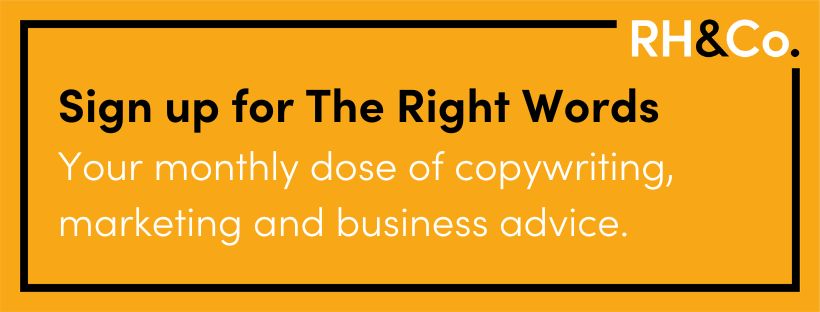
“What should I look for in a copywriter?” I was so pleased to be asked this question recently. It’s one I wish more people asked. After all, if you’re going to entrust the words that represent your brand to someone, you want to make sure they’re going to do a good job. But so few people do any real research before making their choice.
What is a copywriter?
First things first, let’s define what a copywriter actually is and does. And no, it’s nothing to do with helping businesses secure copyright for their products or ideas.
The Merriam-Webster dictionary defines a copywriter as “someone whose job is to write the words for advertisements”. But that definition is pretty old fashioned and limited.
In fact, a good copywriter should be able to produce everything from website copy to blog posts, ad text, brochures, white papers, social media content, flyers, video scripts and more. Basically, if you need words for your business, go to a copywriter.
More than good grammar
So how do you tell whether someone is a good copywriter or not? Because it’s not as simple as being able to “write nicely”, or making sure the spelling, grammar and punctuation is right.
Those things are important, of course, but let’s face it – there are quite a few people who passed their GCSE English exams. Unlike brain surgery or advanced robotics, we all learn to write to some degree at school, which means plenty of people are more than capable of stringing a passable sentence together.
So, here’s what a copywriter needs to do for you…

A good copywriter will draw out your message
The copywriting process begins during the briefing, when your copywriter should be able to go beyond what you’re telling them and ask the kind of questions that really get to the heart of what you’re trying to communicate.
A good copywriter will sell the benefits
Whether writing a simple flyer or a complex website, it’s about understanding your target audience and what benefits will help them make the decision to buy from you. Yes, you might sell the most sophisticated widgets in town, but if your customers care about the fact that those widgets will protect their kids or save them money on their water bill then that’s what you need to talk about first, not the flashy tech.
A good copywriter will guide people around your website
Focusing just on website content now, one really important issue is navigability. Having gained a visitor to your site, the last thing you want is for them to click away before they’ve found what they’re looking for. Having understood your target clients, a good copywriter will use each element of the text – especially on the home page and any other landing pages – to clearly and quickly funnel them to the most relevant part of the site for their needs.
A good copywriter will understand page furniture
Strictly speaking a magazine term, but one that can apply more generally across any published material, on or offline. From subheads and bullet points that break up copy and improve scannability, to eye-catching pull quotes and buttons that drive action, there’s a lot more to great copy than well written body text.
A good copywriter will use the right amount of words
Which is usually less than you’d think. A good copywriter isn’t enamoured with the eloquence of their own writing. They understand that the reader is busy and probably just needs to get to the point. Of course, there are exceptions – but a good copywriter will know that too!
If you’re planning on getting a professional in to help you with your marketing copy, do make sure you do a bit of digging to see whether they’ll be able to genuinely help you. Check out their qualifications, ask for referrals and most importantly, have a look at work they’ve already done.
Because if you pick someone who simply “writes nicely” and spells properly, you’re going to miss out. And I don’t want that for you, because your business is worth more than that and if you’re going to pay a professional, you need to know that they’re really good at what they do.

Making the decision to spend money takes some thought, and the more money involved, the more thought it needs. Assuming you’re not selling penny sweets, your clients and customers are likely to go through a journey something like this when it comes to their relationship with your brand:
Know – Like – Trust – Try – Buy – Repeat – Refer
This is a helpful way to think about your marketing, which should be meeting customers wherever they are along that path. And each stage will have a particular style of marketing that suits it. Although you’ll need to experiment to see what works best for your brand, here are a few ideas to get you started…
Know
Brand awareness is an important marketing goal but it can be hard to track ROI (return on investment). The key is to target fairly widely while keeping costs low. For that reason, social media is a good option at this stage. Make sure that you’re very clear about differentiating yourself from the competition, and be sure to clearly communicate your core brand values, benefits and so on from the outset.
Like
If you’ve done your client personas, you’ll know exactly what your target audience wants and needs, which means it shouldn’t be too hard to get them to like your brand. You can use pretty much any kind of media to engage your audience at this stage – blog posts, video, social – so long as it adds value for them. Creating personalised and segmented content will help get them to the like stage much more quickly.

Trust
People are far more likely to buy from you if someone they know or respect endorses you. Testimonials, case studies and referrals on platforms like LinkedIn can go a long way to building trust, so don’t neglect this aspect of your marketing. Establishing expertise is another important way to build trust, and this can be done very effectively via a blog or vlog, or by being quoted as an expert in relevant press.
Try
Promotional offers are a great way to get people to try your products and services, reducing the amount of thought they need to put into the transaction by reducing the price. But some brands prefer to avoid discounting as a strategy. In that case, you could offer a taster product or service. For example, free webinars or low cost workshops are a popular way for service businesses to get people trying what they have to offer. The equivalent in retail might be sample size perfumes.
Buy
This is the stage where you leave the realm of marketing, and step sideways into sales. But don’t ditch your marketing hat completely. If you’ve got a potential buyer who is wavering, you’ll need to support their transition to the sale by reinforcing all the messaging you’ve used in the stages leading to this moment, especially the ones around trust. That’s why testimonials on a sales pages are an absolute must.
Repeat
If you think that once people have reached the buy stage you can forget about marketing, I’m afraid you’re wrong! If you’ve spent all this time getting a client on board, it would be frustrating for them to disappear after one transaction. Capturing email data at this stage is vital so you can use it to follow up and ensure that the aftercare they get reinforces their great customer experience so far.
Refer
Getting referrals from happy clients is the holy grail of marketing, but most businesses forget to ask for them. There’s nothing wrong with a follow up email a week or two after a sale has been made or a job completed, checking on how everything is going, whether your customer would be happy to write a testimonial or refer you to someone they know who might be looking for something similar. You could even incentivise referrals, for example offering discounts to both parties for any work that comes from it.
Thinking through your customer’s buying journey like this will help you create the right message for the right stage, and should get more people to ‘buy’ and beyond. As always, experiment and don’t hesitate to ask for feedback when people reach the buy stage to find out what helped them along the way.

